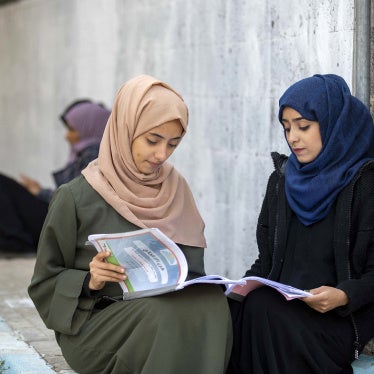Quotas for women always make the news in this part of the world and in Beirut, they will be the talk of the town this week. The third annual New Arab Woman Forum will take place here on October 15 and16, bringing together regional and international participants and distinguished speakers to discuss the changing roles of women in Arab society. Participants anticipate lively debates about quotas for women's political participation and other issues affecting women in the region.
Women's participation in national politics, at 18 percent of elected national legislatures globally, is pretty dismal. Some countries have made impressive progress, including Sweden and Rwanda, where women constitute more than 40 percent of the national parliaments. The Middle East and North Africa region has the lowest rates in the world though, with less than 10 percent of elected parliamentarians being women. Discussions about barriers to women's political participation and the failures to remove them are likely to dominate the forum.
There are many reasons for women's low levels of participation. Societal attitudes about a woman's place have historically held us back and have relegated women to the kitchen and the bedroom.
Limited education and employment opportunities also have a negative impact on Arab women's ability to enter and be effective in their political systems. While many girls get a primary education, there remains a considerable gap between the percentage of boys and girls who complete secondary school. According to the Economic and Social Commission of Western Asia, almost 44 million women in the Arab world are illiterate.
Fewer than 30 percent of women in the region are in the formal labor force, the lowest percentage in the world. The women who do work continue to experience discrimination, including wage gaps and occupational segregation. This is important because work experience, and the financial independence that goes along with it, empower women.
Although some women in the Arab world got the right to vote in the 1950s and 1960s, for many others this is a much more recent development. Women in Bahrain only won the right to vote and stand for elections in 2002 and Kuwaiti women in 2005. This means that in many places, women still aren't part of the political scene. Much needs to be done to ensure that they can participate fully and meaningfully.
A number of political systems in the Arab world frankly deny both men and women real power in decision making. This has hindered our abilities to advance in the world and to protect our most fundamental human rights.
One of the solutions that has been proposed regionally to ensure greater political participation by women is a quota system - reserving a percentage of seats in legislative bodies for women. Jordan, Iraq, Morocco and other countries in the region already have put these systems in place. Formulas vary, but women's groups often seek quotas of 20 to 30 percent.
Having a quota may be a fast-track way for women to enter the political arena, but it is not a long-term mechanism to ensure equal representation.
The truth is, in my part of the world, even where there are women politicians, they are often relegated to the so-called soft positions, such as women's ministries. Or they are in politics only because they are members of a ruling dynasty that has dominated politics for years. Either way, they have no real power.
With or without a quota, throughout this region, there are much better ways to enable women to participate meaningfully in public life, and they must start from the ground up. We must not only improve women's access to education, but ensure that this knowledge is applied in their public life. We need to empower women in the workplace because skills learned there can translate to the political sphere, and we need to eliminate all forms of gender discrimination in every sphere.
Most important, we need to give women the skills and tools they need to participate in politics. They should be trained in decision-making, public speaking, leadership and campaign management. Women need to be helped to gain access to financial resources they need to run campaigns. Most important, aspirant women politicians need support from men and women in their communities.
Finally, for our political systems to be more effective, reforms must be made to make politics more representative overall - not just where gender is concerned - in this part of the world. Women can be the entry point for revamping these political systems and play effective roles in nation-building.
That is why the debates this week will ultimately be so important. They will help spread the message to Arab women that we have a right to participate in politics, to vote, and to run for office. We have a right to take an equal role in making all the decisions that govern our lives.








